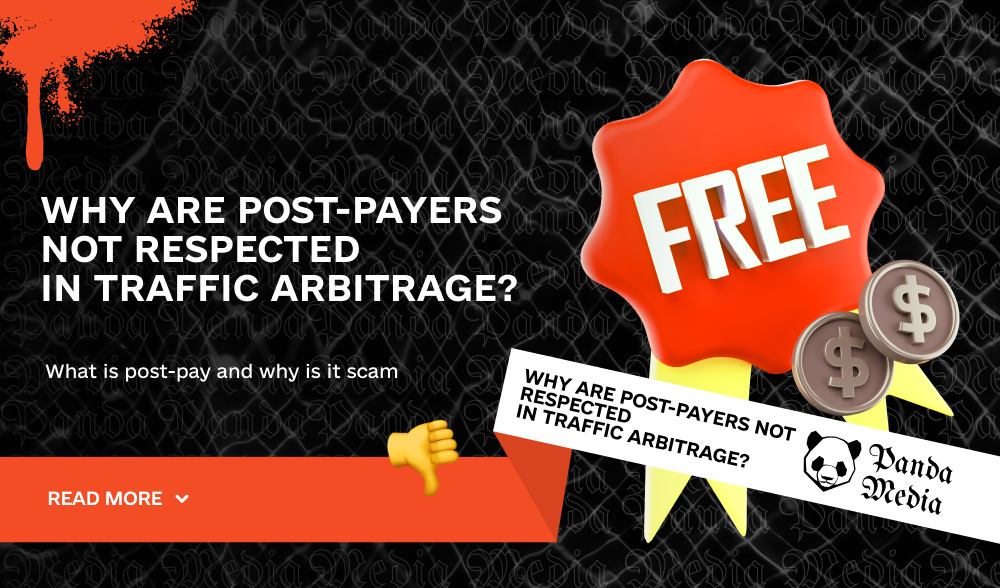
Facebook Ads are the most sought-after traffic source among webmasters nowadays, despite the volatility of this platform. This social network can be both a gold mine for webmasters and a cause of frustration. The main advantage of Facebook is the use of powerful optimization algorithms that allow even with a small budget to quickly find the target audience and generate leads. If successful, it is possible to achieve good results with a small budget. However, there will always be those who are not willing to risk even small amounts of money. Unfortunately, the postpay model opens up the possibility of getting traffic from an advertising platform and leaving without paying. Today we’ll look at the phenomenon of the post-pay in advertising arbitrage.
Post-pay is Facebook’s practice of billing for ad placement after a certain limit has been reached. This creates convenient conditions for cooperation, but at the same time opens the door to fraud. After all, in theory, it’s possible to get traffic to ad campaigns and not pay for it. Facebook debits money on a schedule or when a billing threshold is reached, but you can’t debit funds that don’t actually exist.
Post-pay is a phenomenon present in the ad arbitrage industry where a fraudster willfully avoids paying on the very first debit (which is usually $25).
Post-payers are industry members who purposely abuse this technique by launching multiple accounts and setting up the first write-offs.
The main goal of a first-timer is to cheat the system and get free traffic. The methodology of deception in this case is quite simple: after registration, first-timers launch an advertising campaign until the funds allocated for this purpose are exhausted, then block or reissue the card and close the account. Thus, the platform is unable to debit the card, and the webmaster receives free traffic.
Post-pay, although not accompanied by direct appeals to the court or official statements from Facebook and other platforms, is a form of fraud at the legislative level. In the arbitrage community, post-payers are not respected, their actions are considered unscrupulous, and their income is wrongful.
This phenomenon has only negative consequences for both companies (e.g. Meta Inc., Google) and clients ordering advertising.
The abuse of non-payment leads to stricter service policies. Facebook is actively fighting first-timers by tightening blocking algorithms, introducing new blocking triggers and preauthorization payments. This affects both the scammers themselves (which makes it harder for them to ford) and the entire Facebook advertising industry as a whole.
In addition, Facebook and other platforms are taking additional measures such as introducing RDAs (banning advertising activity), making moderation and card linking processes more complex, and increasing verification and bans. This may lead to the elimination of billing and the introduction of prepaid advertising in some regions.
The rise in fraudsters is forcing security engineers to adapt algorithms. This affects the entire market as exchanges compensate for fraud losses by increasing auction prices for all participants.
Some may think that firstbill is a great way to arbitrage, but in reality it is not. First, it is a chore to create dozens of accounts with a peak bid of $25. Second, firstbills ruin the reputation of all webmasters and have no support in the community. Third, post-pay is not traffic arbitrage because the scammers do not pay for the traffic. Finally, it does not contribute to professional development as it does not teach anything new about affiliate marketing and does not provide future prospects.
Post-pay is a scam. This activity has nothing to do with arbitrage.It is dishonest and cannot be justified. Participating in a primary scam means being an enemy of the entire ad arbitrage community.
It is up to you to decide whether to follow the path of small scammers and stagnate your professional growth in marketing, or to set yourself up for arbitrage. However, remember that a scammer remains a scammer forever. You will be despised by your peers, except for those who also engage in fraud. Is that what you want? Don’t risk trying primary fraud. The small benefit of petty fraud is disproportionate to the damage to your reputation.
Subscribe and get the latest news, material announcements, and unique offers first.